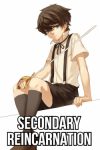
"Defective?” I ask.
The cleric nods, still looking troubled. “Basically, it indicates one who is even more poorly attuned to the weave than a complete beginner. While [Defective] wizards can cast spells, their spells more often than not fail to produce the intended effects.”
“Reason explode?” I ask.
Father Tucker shakes his head. “No, when I say ‘fail to produce the intended effects’, I mean it as failing to activate entirely, or in the case of a damaging spell, failure to hit or to do any damage.” He pauses, contemplative, then mumbles, “[Defective] wizards are incredibly rare, I’d say on the order of [Master] wizards. It usually indicates some kind of trauma to one’s magical aptitude. A curse of some kind. An item of sealing. A spell that backfired horribly. A maiming from combat. None of which should apply to-”
“This rules out a Side Effect as the cause of the explosion, no?” my father interjects. Turning, I see that he has an odd expression on his face, a mix of disappointment and relief.
The cleric nods. “His aptitude is much too low to have one. Looks like we’re back to where we started. How confounding...”
“Perhaps we should try the orb?” my father suggests.
Again, the cleric nods. Then turning to me, he says, “Sammy, this one is called an ‘Orb of Potentiation’. Using it is much more straightforward than the scroll. All you need to do is place your hand on it. Then, it will change in opacity depending on your magical potential.”
“Magical potential?” I ask.
“Consider this. What makes a warrior fast in battle? Well for one, his technique. The way his arms swing, the timing between his breaths, the posture of his torso. These, the warrior has learned. It is his ‘proficiency’ in the art of running. Given two warriors of similar strength, the one with the greater technique wins the race. But what of a warrior born with stronger legs? Without technique, he may still outrun the former. This, is what’s known as ‘aptitude’. Now I ask, can aptitude change?”
I shake my head. “Innate.”
“Yes and no,” the cleric corrects, “One’s aptitude is indeed innate, and yet that does not mean it is immutable. A warrior who suffers a crippling injury to his legs, suffers in aptitude. On the other hand, a warrior who ostensibly uses his legs- squatting, lifting, running- improves it. Independent of his proficiency in running, he grows into his maximum speed, and the rate in which he does so, and the limit to which he can reach, that is what’s known as his ‘potential’. In much the same, the ability for a wizard to grow into their magical aptitude is known as their ‘magical potential’. And this is what the Orb of Potentiation quantifies. So remember, the cloudier it gets, the greater one’s potential to alter one’s aptitude. Does that make sense?”
“Yes.”
“Then whenever you’re ready, place your hand on the sphere to begin.”
I reach out, laying my fingers across the clear glass surface, just barely covering the top of the orb, and while I was told beforehand what was about to happen, it still surprises me when I see the item start to change. Like adding sand to a bucket of water and stirring, the transparent ball slowly starts to darken. It grows cloudy, cloudier, and more cloudy still. Light gray. Dark gray...
Crack!
With a high pitched squeal, the glass shatters beneath my fingers, crumbling into tiny shards onto the table. I instantly reel my hand back, my eyes flying up. “I’m sorry! I broke-!”
My apology is interrupted by the sound of haughty laughter. It’s Father Tucker. “Ho! Ho! Now that’s a first! To think, the orb shattered!”
“What does that mean?” my father asks, his voice cast in worry.
The cleric shrugs. “Hell if I know, excuse the language. If I was forced to answer, I’d say it means boundless potential. But how odd. [Defective] with boundless potential. I do wonder-”
“Father Tucker,” my father interrupts, “If I may say, all these tests, great as they were, have yet to really answer the most pressing question at hand. Is there nothing else we can try?”
The cleric strokes his long white beard. “True. There is one other thing, but you’ll need to come back tomorrow.”
“Why that?” I ask.
The cleric grins with anticipation. “I’ll need to prepare a few things.”



Isn't it obvious that the identification scroll just couldn't read him like how he broke the orb...